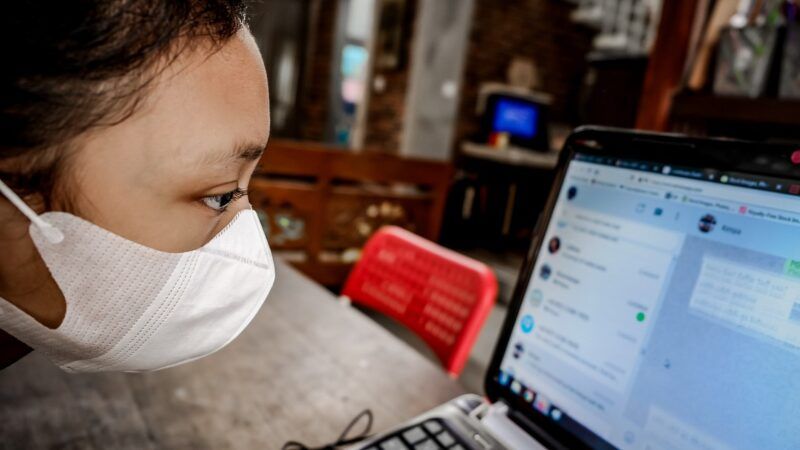Judge Explains First Amendment Basics to Wisconsin Sheriff Who Threatened Teen with Jail for Instagramming Her COVID Infection
No, law enforcement and school officials cannot order students to remove posts about exposure to the coronavirus.

A sheriff violated a teen's First Amendment rights when his department threatened her with jail if she didn't remove an Instagram post about becoming infected with COVID-19, a federal judge has ruled.
Last year, Amyiah Cohoon went on a spring break trip to Florida with schoolmates from Westfield Area High School in Westfield, Wisconsin. The trip coincided with the early spread of COVID-19, the trip was canceled partway through, and she returned home.
When she got home, she began developing symptoms of COVID-19 and sought medical assistance. She posted a picture of herself in April 2020 and described her situation on Instagram, telling people she had been infected.
It wasn't entirely clear whether Cohoon actually had COVID at the time. She tested negative, but she might have missed the detection window—and in those early days, COVID tests weren't nearly as reliable as they are now. Her family says that doctors told her that she probably did have COVID, even if they couldn't prove it at the time.
The day after she posted a picture of herself in a hospital bed with an oxygen mask, a Marquette County deputy showed up at the family's home, sent there by Sheriff Joseph Konrath to order Cohoon to take down the post or face arrest for disorderly conduct.
Cohoon complied, but the family also filed a lawsuit against the sheriff's department with representation from the Wisconsin Institute for Law and Liberty. Coverage of the lawsuit made the story go viral. It turned out Konrath was apparently acting in response to pressure from Cohoon's school, which was trying to reassure parents that everything was fine and that the county had no infections.
On Friday, U.S. District Judge Brett H. Ludwig, of the U.S. District Court, Eastern District of Wisconsin, granted a summary judgment concluding what was obvious to many observers (but not, it seems, to the sheriff and school): Cohoon's post was protected First Amendment speech, and the sheriff did not have the legal right to order her to remove it.
"Defendants may have preferred to keep Marquette County residents ignorant to the possibility of COVID-19 in their community for a while longer, so they could avoid having to field calls from concerned citizens," Ludwig wrote. "but that preference did not give them authority to hunt down and eradicate inconvenient Instagram posts."
Ludwig firmly reminded the sheriff that even if Cohoon had been wrong about her infection—even if she had been deliberately lying—he still shouldn't have ordered her to take it down: "The Marquette County Sheriff had no more ability to silence Amyiah's posts than it would to silence the many talking heads on cable news, who routinely pronounce one-sided hot takes on the issues of the day, purposefully ignoring any inconvenient facts that might disrupt their preferred narratives. Indeed, even if Amyiah's posts had been untruthful, no court has ever suggested that noncommercial false speech is exempt from First Amendment scrutiny."
It's an interesting time capsule. While many of us now are frustrated at government responses that exaggerate the risks of infection among the vaccinated while at the same time dragging their feet on access to vaccination boosters and home testing, let's not forget about the early days, when the authorities had their heads in the sand and tried to act like everything was going to be just fine.


Show Comments (69)